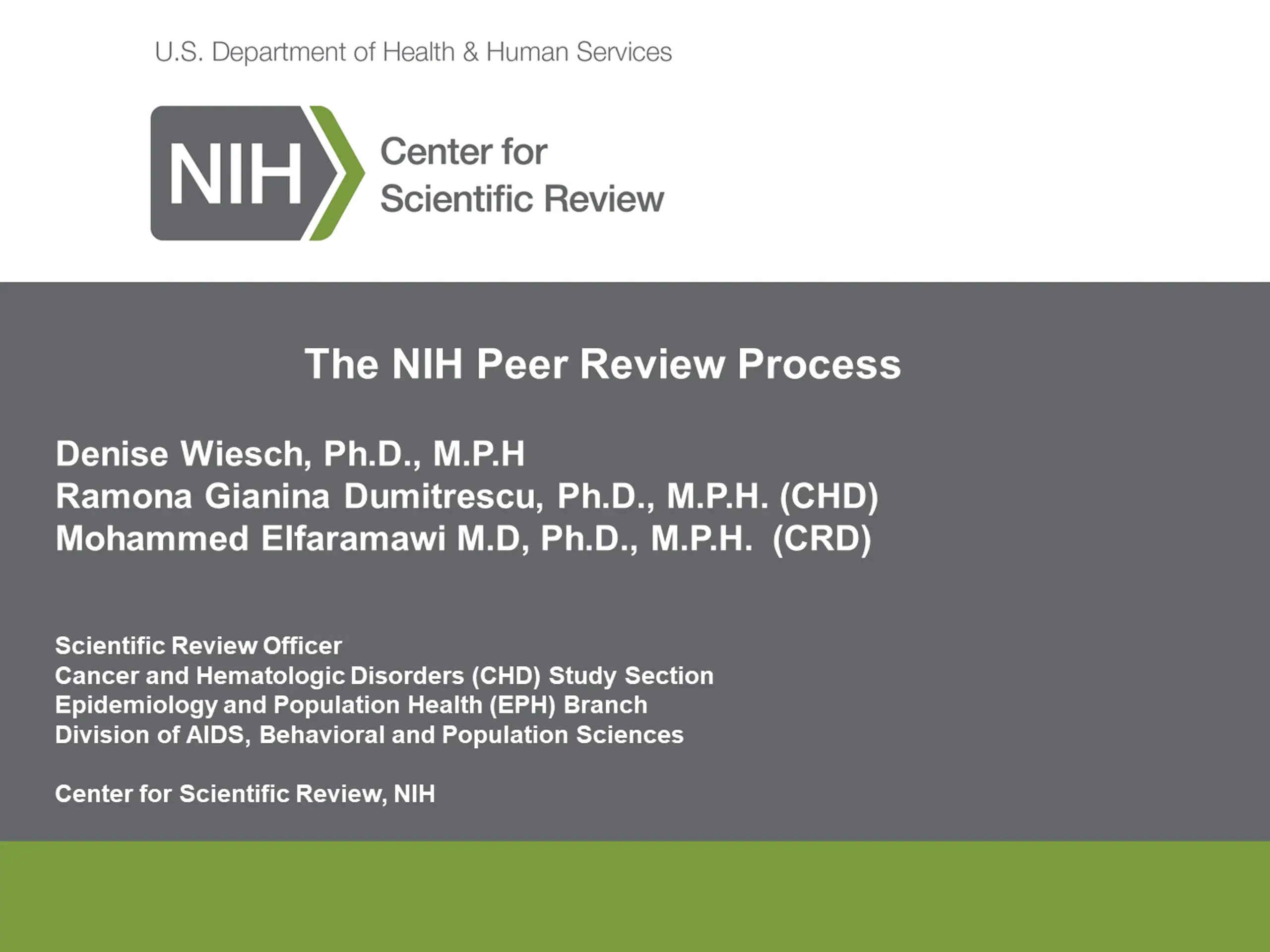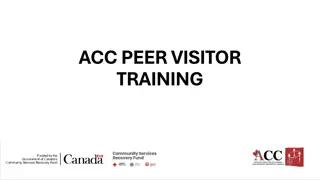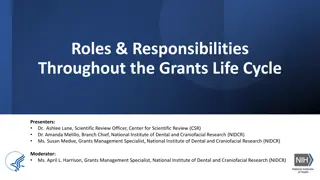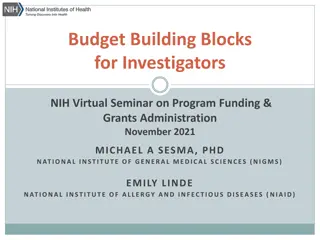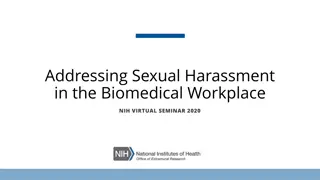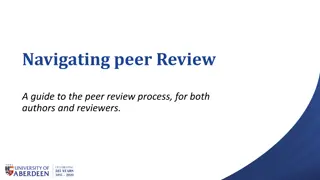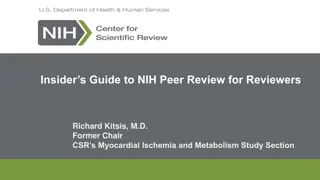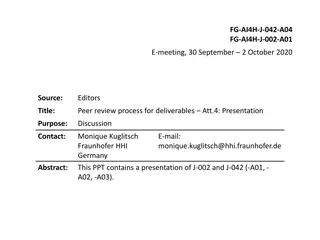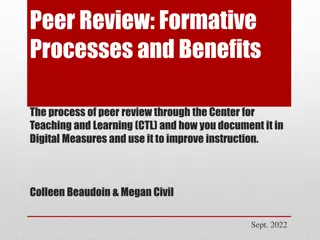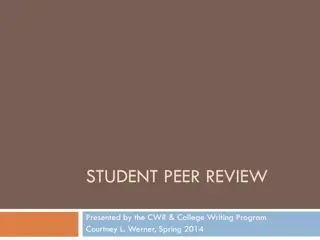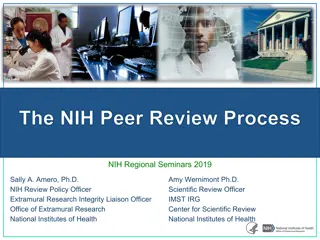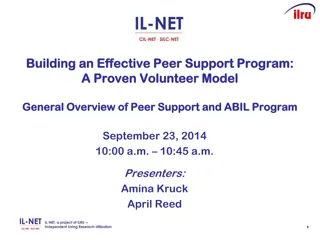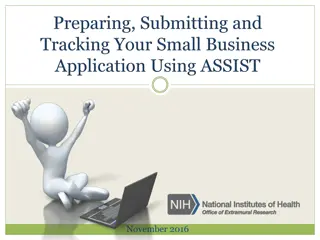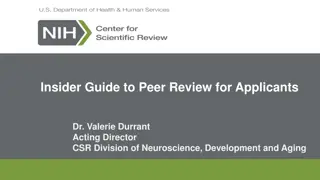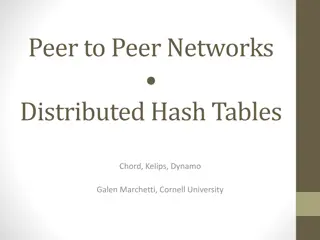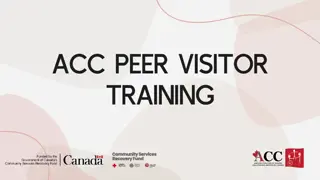The NIH Peer Review Process
The NIH Peer Review Process, including the role of the Center for Scientific Review (CSR) in receiving, referring, and reviewing grant applications. Understand how applications are assigned to institutes or centers and the importance of scientific and technical merit in the review process.
Download Presentation

Please find below an Image/Link to download the presentation.
The content on the website is provided AS IS for your information and personal use only. It may not be sold, licensed, or shared on other websites without obtaining consent from the author.If you encounter any issues during the download, it is possible that the publisher has removed the file from their server.
You are allowed to download the files provided on this website for personal or commercial use, subject to the condition that they are used lawfully. All files are the property of their respective owners.
The content on the website is provided AS IS for your information and personal use only. It may not be sold, licensed, or shared on other websites without obtaining consent from the author.
E N D
Presentation Transcript
The NIH Peer Review Process Denise Wiesch, Ph.D., M.P.H Ramona Gianina Dumitrescu, Ph.D., M.P.H. (CHD) Mohammed Elfaramawi M.D, Ph.D., M.P.H. (CRD) Scientific Review Officer Cancer and Hematologic Disorders (CHD) Study Section Epidemiology and Population Health (EPH) Branch Division of AIDS, Behavioral and Population Sciences Center for Scientific Review, NIH
Role of CSR: Receipt & Referral, Review The Center for Scientific Review (CSR) receives all NIH grant applications Refers applications to CSR or NIH institute scientific review groups for review of scientific merit Refers applications to one or more NIH institutes or centers (IC) for funding Administers the review of scientific merit of most NIH research applications Study section in CSR review 76% of all NIH grant applications = ~61,000 applications a year CSR study sections are not IC specific
CSRs Division of Receipt and Referral Determines if your application is On time Formatted correctly Complete Compliant with NIH policy Assigns your application to Institute(s) or center for funding consideration Review group for review of scientific and technical merit If you have questions during these stages, please reach out to DRR: csrdrr@mail.nih.gov
Applications Are Assigned to: Institutes or Centers based on Overall mission and guidelines of the IC (Institute/Center) Specific programmatic mandates and interests of the IC Applications can only be assigned to ICs participating in the FOA Scientific review groups based on Specific, published review guidelines for each review group Suggestions made in the Assignment Request Form are considered Referral Process: DRR Referral Officers Branch Chiefs SROs Applicant
ENQUIRE: Overview and details https://public.csr.nih.gov/StudySections/CSREnquire 7
Epidemiology and Population Health scientific review groups ended after summer 2022 review meetings Behavioral Genetics and Epidemiology (BGES) Biostatistical Methods and Research Design (BMRD) Cancer, Heart, and Sleep Epidemiology Panel A (CHSA) Cancer, Heart, and Sleep Epidemiology Panel B (CHSB) Clinical Research & Field Studies of Infectious Disease* (CRFS) Infectious Diseases, Reproductive Health, Asthma and Pulmonary Conditions* (IRAP) Kidney, Nutrition, Obesity, and Diabetes (KNOD) Neurological, Aging and Musculoskeletal Epidemiology* (NAME) (*and overflow SEPs) Revised scope after 2022 review meetings: Genetics of Health and Disease (GHD)
New Epidemiology and Population Health Branch Conceptual Framework Aging, Injury, Musculoskeletal, and Rheumatologic Disorders (AIMR) Reproductive, Perinatal, and Pediatric Health (RPPH) Population-based Research in Infectious Disease (PRID) Cancer and Hematological Disorders (CHD) Cardiovascular and Respiratory Diseases (CRD) Kidney, Endocrine, and Digestive Disorders (KEDD) Neurological, Mental, and Behavioral Health (NMBH) Health States Data/Methods Exposure Lifestyle and Health Behaviors (LHB) Social and Environmental Determinants of Health (SEDH) Analytics and Statistics for Population Research panel A (ASPA) Analytics and Statistics for Population Research panel B (ASPB)
CHD study section scope and topics Scope: reviews applications that seek to understand the etiology, determinants, distribution and outcomes of cancer and hematologic disorders, conditions and phenotypes from a population health perspective. Topics: Incidence, prevalence, progression and consequences of cancers in large populations including the focus on early detection, survivorship and recurrence Incidence, prevalence, progression and consequences of hematologic disease and phenotypes in large populations, including but not limited to anemias, disorders of coagulation, lymphomas and leukemias Effects of environmental and other exposures on incidence, progression, and outcomes related to cancer and hematologic disorders in large populations Incidence, prevalence and determinants of co-morbidities and multi- morbidities in populations with cancer and hematological disorders
CRD study section scope and topics Scope: reviews applications that seek to understand the etiology, determinants, distribution and outcomes of cardiovascular and respiratory phenotypes, disorders and diseases from a population health perspective. Topics: Incidence, prevalence, progression and consequences of cardiovascular and disorders in large populations that include but are not limited to heart failure, atherosclerosis, pulmonary vascular disease and myocardial infarction Incidence, prevalence, progression and consequences of respiratory diseases and disorders in large populations that include but are not limited to chronic obstructive pulmonary disease (COPD), asthma, and bronchopulmonary dysplasia Effects of environmental and other exposures on incidence, progression, and outcomes related to cardiovascular and respiratory health in large populations, especially with a focus on the disease or disorder outcome rather than the exposure Incidence, prevalence and determinants of co-morbidities and multi-morbidities in populations with cardiovascular and respiratory diseases
Examples of study sections of shared interest with CHD Social and Environmental Determinants of Health SEDH Clinical Integrative Cardiovascular and Hematological Sciences CCHS Clinical Oncology Study Section CONC Cardiovascular and Respiratory Diseases CRD (epi) Lifestyle and Health Behaviors LHB Effect of Social, Environmental and Health Behaviors on Cancer and Hematological Disorders Clinical research of Hematological Disorders and Cancer CHD Genetic predisposition to cancer and hematological disorders Cancer Genetics Study Section CG Molecular Cancer Diagnosis and Classification MCDC Analytics and Statistics for Population Research Panel A ASPA Ethnic and racial disparities in cancer outcomes Basic Mechanisms in Cancer Health Disparities BMCD
Study Sections that have typically reviewed Cancer-related Cardiotoxicity applications: Retired Study Sections CHSA CHSB CICS CCHF MIM Now Covered by Cancer and Hematologic Disorders (CHD) Cardiovascular and Respiratory Disorders (CRD) Clinical Integrative Cardiovascular and Hematologic Sciences (CCHS) Integrative Myocardial Physiology / Pathophysiology A / B (MPPA and MPPB) Health Services Quality and Effectiveness (HSQE) Organization and Delivery of Health Services (ODHS) Clinical Management in General Care Settings (CMGC) Interdisciplinary Clinical Care in Specialty Care Settings (ICSC) Advanced Therapeutics (ATA) HSOD NRCS DT RTB Radiation Therapeutics and Biology (RTB) https://public.csr.nih.gov/StudySections
Assignment Request Form (ARF) Not required Suggest assignments (study section and institute) Identify potential conflicts of interest List areas of expertise needed to evaluate the application Speak freely! This form will not be part of the assembled application; it will not be made available to program or to reviewers.
Who Can Answer Your Questions? Before you submit your application A program officer (PO) at an NIH Institute or Center Scientific review officer (SRO) CSR Division of Receipt and Referral (csrdrr@mail.nih.gov) After you submit Your SRO CSR Division of Receipt and Referral (csrdrr@mail.nih.gov) After your review Your assigned PO Grants Info: GrantsInfo@od.nih.gov 301 945-7573
Serve on a Review Panel Established Investigators can serve as Ad Hoc or Regular Members say yes when invited! Early career scientists can enroll in CSR s early career reviewer (ECR) program. ECR s serve one time and review 2 applications as Reviewere#3. For ECR qualifications and application process. https://public.csr.nih.gov/ForRevie wers/BecomeAReviewer/ECR Aimed at early career, independent scientists postdocs are not eligible and tenured professors are not eligible Review experience and successful competition for an R01 or equivalent are disqualifiers.
Other Resources Webinars - Early Career Reviewer Panel Q & A and Grants 101 - https://public.csr.nih.gov/NewsAndPolicy/PeerReviewVideos Sample applications at https://www.niaid.nih.gov/grants- contracts/sample-applications
Key NIH Review and Grants Web Sites NIH Center for Scientific Review http://www.csr.nih.gov NIH Office of Extramural Research http://grants.nih.gov/
